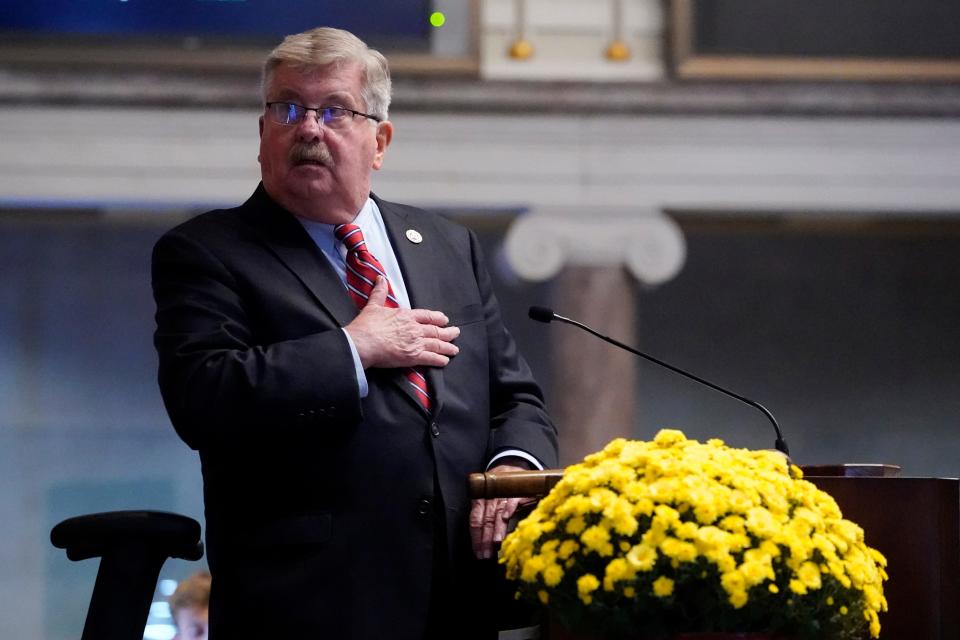Campaign finance reform bill passes after McNally issues rebuke of dark-money groups
- Oops!Something went wrong.Please try again later.
- Oops!Something went wrong.Please try again later.
Editor's note: This story has been updated to correct and provide additional information about Tennesseans for Student Success.
After a last-day negotiation, lawmakers passed a campaign finance and ethics reform bill to provide a spotlight on dark-money groups.
The bill, HB 1201, requires 501(c)4s, often considered dark-money organizations, to disclose any expenses over $5,000 in the 60 days leading up to an election when using candidate names and images.
Groups like Americans for Prosperity and Tennessee Stands opposed the bill because they would be required to do this reporting.
A spokesperson for another group, Tennessee Students for Success, said on Friday after the conclusion of the legislative session that the organization had questions about the bill and its impact but did not formally oppose or lobby against it.
Earlier this week, Lt. Gov. Randy McNally, R-Oak Ridge, publicly called out these organizations for "circulating untruths" about the bill.
In other news: Lawmakers pass Gov. Bill Lee's new K-12 education funding formula
More: Attorneys seek halt to executions as Oscar Franklin Smith 'oversight' investigated
"It is amazing that various seemingly 'legitimate' groups are resorting to such disingenuous tactics to oppose it," McNally said in a statement. "Is it because they are spending so much that Tennesseans would be appalled if they knew? Or is it that they spend so little that they fear they would be exposed as political grifters working to enrich only themselves?"

Sen. Janice Bowling, R-Tullahoma, was the lone opposition in the Senate. During a vote on the original version of the bill Bowling's concerns mirrored those of the 501(c)4s.
Sen. Ferrell Haile, R-Gallatin, a co-sponsor of the legislation, countered Bowling by calling the bill a "step in the right direction."
"If someone is intent on violating the law, of being dishonest, there's very little you can do to stop that," Haile said. "What this does is put up parameters on what we should be doing and gives us some additional transparency. "
The dark-money group disclosure is one of several provisions in the bill.
The bill's final version, negotiated between the House and Senate Thursday, would enhance several disclosure laws around campaign service companies and make various changes to increase transparency with the Tennessee Registry of Election Finance.
In the House, Rep. Scotty Campbell, R-Mountain City, Rep. Tim Rudd, R-Murfreesboro and Rep. Todd Warner, R-Chapel Hill, voted against the legislation.
The bill passed the house with a 85-3 vote, and in the Senate 31-1.
Bill reflects need to take action following indictments earlier this year
Some of these provisions in the bill directly respond to actions by former speaker and current Rep. Glen Casada, R-Franklin, and former Rep. Robin Smith, R-Hixson.
In March, Smith pleaded guilty to a federal wire fraud charge for her involvement with the shadowy firm Phoenix Solutions last month.
Smith's charging documents alleged Casada and his former chief of staff, Cade Cothren, were involved in a kickback scheme that netted business from multiple lawmakers and House legislative services.
Neither have been charged in the case.
Casada has declined to comment. Cothren has not responded to repeated Tennessean requests for comment about the case.
Sports news: There's a bleak reality if Juuse Saros is out for Nashville Predators' playoff push
More: New report details abuses at Wilder Youth Development Center: What to know
Several lawmakers testified in front of a federal grand jury earlier this year.
Other provisions in the bill
The Tennessee Registry of Election Finance can't accept a settlement of over $25,000 outside of a public meeting.
Registry meetings must be published online five days in advance.
A candidate cannot have more than $2,000 of unitemized contributions in a reporting period. Any contribution over that amount with have to be itemized.
All expenses during a reporting period must be disclosed even if they are under $100.
A candidate's contributions are automatically audited if more than 30% of the contributions are reported as unitemized.
Any person who personally controls a political action committee's expenditures is personally liable for any fines from the registry.
A political action committee cannot pay a fine issued against a candidate by the registry.
Members or companies that provide campaign services will have to disclose if they pay a member of the general assembly or a staff member of the general assembly
All the provisions in the bill can be found here.
Melissa Brown contributed to this report.
Adam Friedman is The Tennessean’s state government and politics reporter. Reach him by email at afriedman@tennessean.com.
Want to read more stories like this? A subscription to one of our Tennessee publications gets you unlimited access to all the latest politics news, plus newsletters, a personalized mobile experience and the ability to tap into stories, photos and videos from throughout the USA TODAY Network's daily sites.
This article originally appeared on Nashville Tennessean: Dark-money groups to required disclose spending on new Tennessee bill

